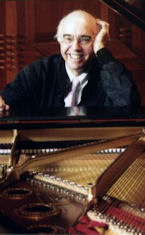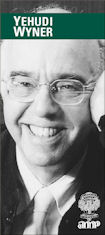|
|
Yehudi Wyner (Conductor) |
|
Born: June 1, 1929 - Calgary, Alberta, Canada |
|
The Canadian-born American composer, pianist, conductor, and music educator, Yehudi Wyner (real name, Weiner), was born in Western Canada, but grew up in New York City. He came into a musical family. His father, Lazar Weiner, was the pre-eminent composer of Yiddish Art Song as well as a notable creator of liturgical music for the modern synagogue. He received his early training as pianist and composer and after graduating from the Juilliard School of Music in New York with a Diploma in piano (1946), he went on to study with Richard Donovan and Paul Hindemith at Yale University (Bachelor of Art, 1950; Bachelor of Music, 1951; Master of Music, 1953) and with Walter Piston at Harvard University (Master of Art, 1952). A Handel course at Harvard brought Wyner to the attention of Randall Thompson, who became a staunch supporter and friend.
In 1953, Yehudi Wyner won the Rome Prize in Composition enabling him to live for the next three years at the American Academy in Rome, composing, playing, and travelling (until 1956). Upon his return to America he began an active career as a musician. In the course of this work he has been a solo pianist, chamber musician, collaborator with notable singers and instrumentalists, conductor of numerous chamber and vocal ensembles in a wide range of repertory, and of course, composer and teacher. He also served as Music Director of the Turnau Opera, a repertory company, and of the New Haven Opera Society. Since 1968 he has been keyboard artist for the Bach Aria Group. In this capacity he has played and conducted a substantial number of the Bach cantatas, concertos and motets. He also performed and recorded contemporary music in New York.
Yehudi Wyner's teaching has taken him to several universities. At Yale, where he taught for 14 years (1963-1977), he was head of the Composition faculty from 1969 to 1973. From 1975 to 1997 he was on the piano and music faculty of the Berkshire Music Center in Tanglewood. At the State University of New York (SUNY) at Purchase as Professor of Music (1978-1989), he was also Dean of the Music Division for several years (1978-1982). In 1982 he was composer-in-residence at the Sante Fe Chamber Music Festival. In 1987 (or 1986) he was a visiting professor of composition at Cornell University. In 1987-1988 he was a visiting professor at the Brandeis University, and then served as the Walter W. Naumburg Professor of Composition there from 1989 (or 1991). He was also director of the Brandeis Contemporary Chamber Players. In 1991 he was composer-in-residence at the American Academy in Rome, and in 1998 at the Rockefeller Center at Bellagio, Italy. He has also been a frequent visiting professor at Harvard University. Notable students: Chester Biscardi, Craig Walsh, and Michael H. Weinstein.
Honours received in recognition and support of his work have included two Guggenheim Fellowships (1958-1959, 1977-1978), a grant from the American Institute of Arts and Letters, the Brandeis Creative Arts Award, commissions from the Ford Foundation, The Koussevitzky Foundation at the Library of Congress, the National Endowment for the Arts (1976), the Santa Fe Chamber Music Festival, Bravo! Colorado Music Festival, Michigan and Yale Universities and many chamber music ensembles including Delos String Quartet, Aeolian Chamber Players, DaCapo, Parnassus, Collage, No Dogs Allowed, the Boston Symphony Chamber Players, and 20th Century Unlimited. Recordings of his music can be found on New World Records, Naxos, Bridge, Albany Records, Pro Arte, CRI, 4Tay Records, and Columbia Records.
In 1998 Yehudi Wyner received the Elise Stoeger Award from Chamber Music Society of Lincoln Center for his lifetime contribution to chamber music. His Horn trio was a finalist for the Pulitzer Prize (1998). In 1999 he was elected to the American Academy of Arts and Letters. His music is published by Associated Music Publishers, Inc.
Yehudi Wyner married the soprano Susan Davenny Wyner in 1967. |
|
Music |
|
Yehudi Wyner has created a diverse body of over 60 works include compositions for orchestra, chamber ensembles, solo voice and solo instruments, and music for the theatre, as well as liturgical services for worship. Many compositions were created for his wife, Susan Davenny Wyner: Among them are Intermedio (1976), a lyric ballet for soprano and string orchestra; Fragments from Antiquity (1978-1981) for soprano and orchestra; and On This Most Voluptuous Night (1982), for soprano and chamber ensemble. In his music, Wyner often seeks to reconcile disparate elements of past and present, of high and low art. Classical, chromatic and serial elements coexist, together with notable ingredients of popular and melodic and gestural inflections from his Jewish heritage. The result is an eclectic but personal style, poetic and lyrical in essence.
Some recent orchestral works include: Prologue and Narrative for Cello and Orchestra (1994), commissioned by the BBC Philharmonic for the Manchester International Cello Festival; Lyric Harmony for orchestra (1995), commissioned by Carnegie Hall for the American Composers Orchestra; and Epilogue for orchestra (1996), commissioned by the Yale School of Music. Recent works for other forces include: String Quartet (1985); Toward the Center for piano (1988); Sweet Consort for flute and piano (1988); To Be a Dragon choruses for women's voices (1989); Trapunto Junction for 3 brass and percussion (1991), commissioned by the Boston Symphony Chamber Players; Praise Ye the Lord, Psalm for soprano and ensemble (1996), commissioned by Dawn Upshaw and the 92nd Street Y; Horntrio (1997) commissioned by World-wide Concurrent Premieres Inc. for 40 ensembles world-wide; Madrigal for String Quartet (1999), commissioned by the Lydian String Quartet at Brandeis; The Second Madrigal: Voices of Women (1999), commissioned by the Koussevitzky Foundation at the Library of Congress; Tuscan Triptych: Echoes of Hannibal for string orchestra (2002); Commedia for clarinet and piano (2002), commissioned by Emanuel Ax and Richard Stoltzman.
His piano concerto, Chiavi in mano, won the 2006 Pulitzer Prize in Music. It was commissioned by the Boston Symphony Orchestra, and premiered by soloist Robert Levin and the Boston Symphony Orchestra in February 2005. Currently he is completing a clarinet trio for Richard Stoltzman (clarinet), Lynn Harrell (cello), and Robert Levin (piano) commissioned by Chamber Music San Francisco to be premiered in March 2010.
Among Wyner's most important works is the liturgical piece Friday Evening Service for cantor and chorus (1963). It was in fact his Friday Evening Service that began his original association with Associated Music Publishers. He elaborates, "The circumstances of my initial contact with Schirmer/AMP [came about] in the spring of 1963, [when] the premiere of my new Friday Evening Service took place at the Park Avenue Synagogue in New York. The next day, I received a call from a person, then unknown to me, named Hans Heinsheimer [former G. Schirmer Director of Publications]. After identifying himself, he said that Samuel Barber had attended the premiere and urged Heinsheimer to be in touch with me to discuss a possible publishing relationship. Of course I was astonished!" |
|
Selected Works |
|
Dramatic: Incidental Music:
The Old Glory (1964)
The Mirror (1972-1973)
Orchestral:
Da Camera for piano and orchestra (1967)
Prologue and narrative for celloand orchestra (1994)
for piano and orchestra (1967)
Prologue and narrative for celloand orchestra (1994)
Chamber:
Dance variations for wind octet (1953; revised 1959)
Concerto Duo for violin and piano (1955-1957)
Serenade for flute, horn, trumpet, trombone, viola, ícello, piano (1958)
3 Informal Pieces for violin and piano (1961; revised 1969)
Cadenza for clarinet and harpsichord (1969)
De novo for cello and ensemble (1971)
Dances of Atonement for violin and piano (1976)
All the Rage for flute and piano (1980)
Romances for piano quartet (1980)
Tanz and Maissele for clarinet, violin, cello and piano (1981)
Passage I for ensemble (1983)
Wind Quintet (1984)
String Quartet (1985)
Composition for viola and piano (1987)
Trapunto Junction for trumpet, French horn, trombone and percussion (1991)
Amadeusí billiard for violin, viola, bass, bassoon and 2 horns : (after Mozart's Divertimento No. 7, K. 205) (1991)
Horntrio (1997)
Quartet for oboe and string trio (1999)
Commedia for clarinet in B♭ and piano (2003)
for wind octet (1953; revised 1959)
Concerto Duo for violin and piano (1955-1957)
Serenade for flute, horn, trumpet, trombone, viola, ícello, piano (1958)
3 Informal Pieces for violin and piano (1961; revised 1969)
Cadenza for clarinet and harpsichord (1969)
De novo for cello and ensemble (1971)
Dances of Atonement for violin and piano (1976)
All the Rage for flute and piano (1980)
Romances for piano quartet (1980)
Tanz and Maissele for clarinet, violin, cello and piano (1981)
Passage I for ensemble (1983)
Wind Quintet (1984)
String Quartet (1985)
Composition for viola and piano (1987)
Trapunto Junction for trumpet, French horn, trombone and percussion (1991)
Amadeusí billiard for violin, viola, bass, bassoon and 2 horns : (after Mozart's Divertimento No. 7, K. 205) (1991)
Horntrio (1997)
Quartet for oboe and string trio (1999)
Commedia for clarinet in B♭ and piano (2003)
Keyboard:
Partita for piano (1952)
Piano Sonata (1954)
Vocal:
Friday Evening Service for cantor, chorus and organ (1963)
Torah Service for chorus & instruments (1966)
Memorial Music for soprano and 3 flutes (1971-1973)
Canto cantabile for soprano and band (1972)
Intermedio, Lyric ballet for soprano and strings (1974)
Fragments from Antiquity for soprano and orchestra (1978-1981)
The Grass is High for voice and piano (1979)
On this Most Voluptuous Night for soprano and 7 instruments (1982)
The second madrigal: Voices of women (1999) for cantor, chorus and organ (1963)
Torah Service for chorus & instruments (1966)
Memorial Music for soprano and 3 flutes (1971-1973)
Canto cantabile for soprano and band (1972)
Intermedio, Lyric ballet for soprano and strings (1974)
Fragments from Antiquity for soprano and orchestra (1978-1981)
The Grass is High for voice and piano (1979)
On this Most Voluptuous Night for soprano and 7 instruments (1982)
The second madrigal: Voices of women (1999) |
|


|
|
Source: International Who's Who in Music & Musicians' Directory (13th Edition, 1992/93); Bakerís Biographical Dictionary of 20th Century Classical Musicians (1997); G. Schirmer Website (October 2009); Wikipedia Website
Contributed by Aryeh Oron (April 2010) |
|
Yehudi Wyner : Short Biography | Bach Aria Festival Chorus & Orchestra | Recordings of Vocal Works | Bach Aria Festival and Institute |
|
Links to other Sites |
|
Yehudi Weiner Page
Yehudi Weiner (G. Schirmer Inc)
Yehudi Weiner (Milken Archive of American Jewish Music)
Yehudi Weiner (Brandeis University)
Yehudi Weiner (Wikipedia) |
|
|